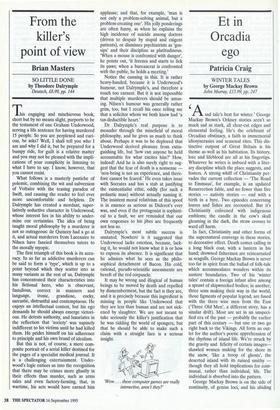Et in Orcadia ego
Patricia Craig
WINTER TALES by George Mackay Brown John Murray, f15.99, pp. 247 Asad tale's best for winter.' George Mackay Brown's Orkney stories aren't so much sad as stark, all clear-cut edges and elemental feeling. He's the celebrant of Orcadian obstinacy, a faith in immemorial idiosyncrasies and seasonal rites. This dis- tinctive outpost of Great Britain is his theme as well as his habitation. Its history, lore and lifeblood are all at his fingertips. Whatever he writes is imbued with a liter- ary discipline which the place suggests, and fosters. A strong whiff of Christianity per- vades the current collection — 'The Road to Emmaus', for example, is an updated Resurrection fable, and no fewer than five stories — nativity stories — end with a birth in a byre. Two episodes concerning loaves and fishes are recounted. But it's Christianity enlivened with indigenous emblems; the candle in the cow's skull gleaming in the dark, the straw crosses to ward off harm.
In fact, Christianity and other forms of the supernatural converge in these stories, to decorative effect. Death comes calling in a long black coat, with a lantern in his hand; drowned fishermen are reincarnated as seagulls. George Mackay Brown is never too far in spirit from the ballad of folk-tale which accommodates wonders within its austere boundaries. Two of his 'winter tales' contain a foreign infant alive among a sprawl of shipwrecked bodies; in another, three sons making their way in the world, those figments of popular legend, are fused with the three wise men from the East (`Three Old Men', a different story, has a similar drift). Most are set in an unspeci- fied era of the past — probably the earlier part of this century — but one or two go right back to the Vikings. All form an out- let for the author's poetic apprehension of the rhythms of island life. We're struck by the gravity and felicity of certain images- shawled women making for the shore in the snow, 'like a troop of ghosts', the deserted island with its ruined smithy though they all hold implications for com- munal, rather than individual, life. The individual is absorbed into the pattern.
George Mackay Brown is on the side of continuity, of genius loci, and his abiding concern is the threat to Orcadian integrity from new-fangled importations of all sorts. However, this is a dicey area and one best approached with ambivalence, as it is here: it's pig-headed to repudiate electric light and keep your money in a tea-caddy, just as it's corrosive to turn your back on tradition. Something 'delicate and unique and rich', a whole local atmosphere and culture, is not to be relinquished without atavistic unease — and George Mackay Brown has the tem- perament, and the expertise, to bolster it up. His fiction is dictated by a benign, con- servationist impulse, and cast in suitably weathered stone.



































































 Previous page
Previous page